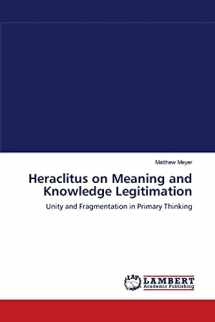
Heraclitus on Meaning and Knowledge Legitimation: Unity and Fragmentation in Primary Thinking
ISBN-13:
9783838304731
ISBN-10:
383830473X
Author:
Matthew Meyer
Publication date:
2009
Publisher:
LAP Lambert Academic Publishing
Format:
Paperback
144 pages
FREE US shipping
Book details
ISBN-13:
9783838304731
ISBN-10:
383830473X
Author:
Matthew Meyer
Publication date:
2009
Publisher:
LAP Lambert Academic Publishing
Format:
Paperback
144 pages
Summary
Heraclitus on Meaning and Knowledge Legitimation: Unity and Fragmentation in Primary Thinking (ISBN-13: 9783838304731 and ISBN-10: 383830473X), written by authors
Matthew Meyer, was published by LAP Lambert Academic Publishing in 2009.
With an overall rating of 4.0 stars, it's a notable title among other
books. You can easily purchase or rent Heraclitus on Meaning and Knowledge Legitimation: Unity and Fragmentation in Primary Thinking (Paperback) from BooksRun,
along with many other new and used
books
and textbooks.
And, if you're looking to sell your copy, our current buyback offer is $0.53.
Description
This book offers a new account of the context in which Heraclitus develops his views on meaning and knowledge. The frame of mythic thinking affords insight into important dimensions of Heraclitus's thought, particularly the simultaneous holism and fragmentation that characterized his ideas on the world and on wisdom. Heraclitus¿s idea of shared thinking captures the holistic-fragmented nature of the social bond perfectly. A close reading of his thought suggests we should not take the continuity of thought as passive or stable. Thus, we discover that the signature Heraclitean concept of the agon (conflict) is present in the fragments that describe shared thinking. The fragments cannot be exhausted of meaning because they capture the very essence of meaning, fragmentation, within. In sum, Heraclitus seems to suggest that philosophy should not wish away conflict and competition in its definitions of the world, but see conflict as the basis of any world it might hope to define.


We would LOVE it if you could help us and other readers by reviewing the book
Book review

Congratulations! We have received your book review.
{user}
{createdAt}
by {truncated_author}


